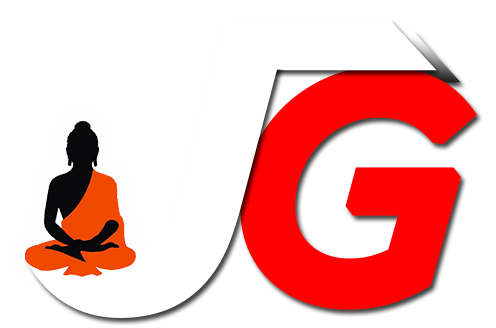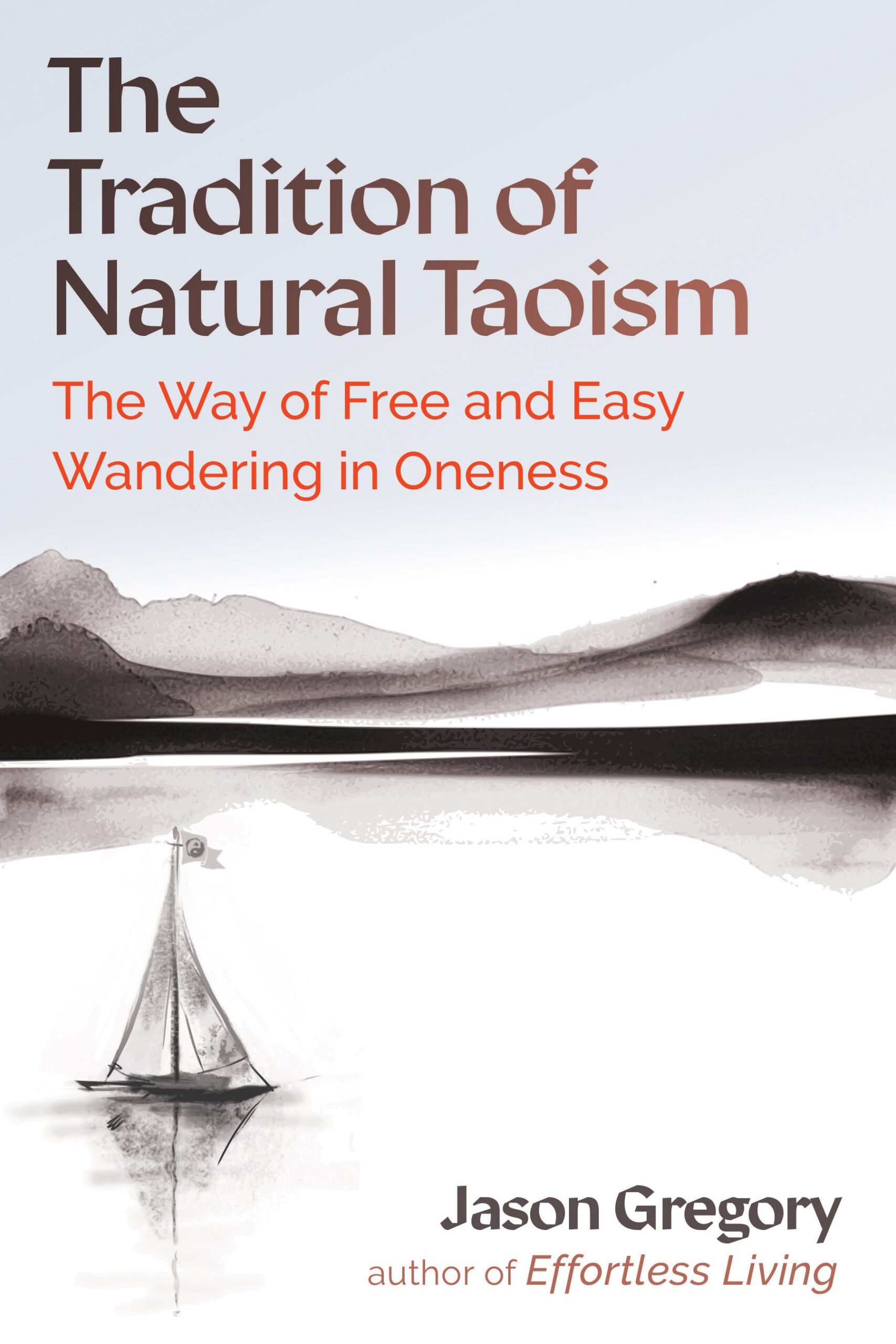Reclaiming Self-Knowledge Online Retreat
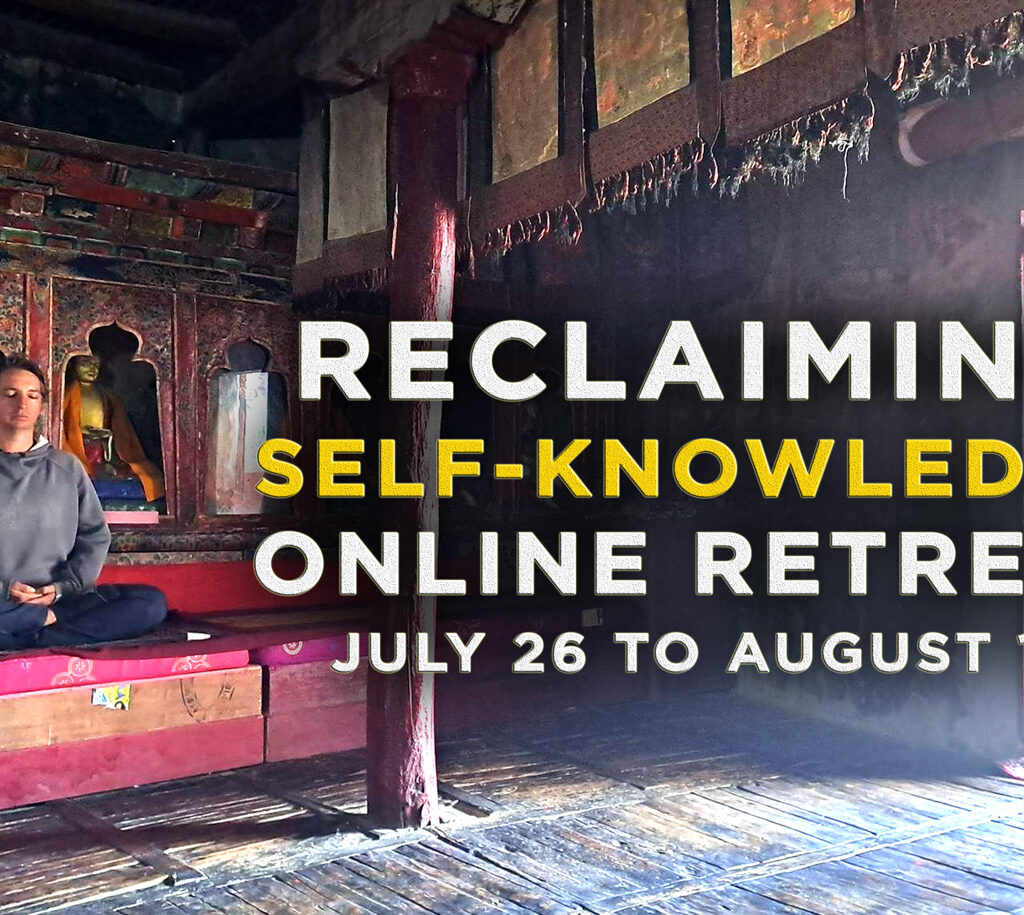
Reclaiming Self-Knowledge Online Retreat Four Live Zoom Sessions | Every Saturday from July 26 – August 16 Join the Shanti Sangha with Jason Gregory for this mid-year online retreat on the nature of Self-Knowledge. In this retreat we will explore the ancient teachings of Atmabodha (Self-Knowledge), the philosophy of Nondualistic Vedanta. Jason will draw on the sixty-eight verses of the Atmabodha text to guide the participants to a greater understanding of this wisdom so that we can all reclaim Self-Knowledge. Each class is in a traditional satsang format which will consist of a 1-hour monologue on the teachings from Jason and then a 30-minute Q&A about these teachings. This will be a great opportunity to explore these teachings together in a place dedicated to the teachings with other sincere spiritual aspirants in the Shanti Sangha. Price and Schedule Cost is $200 USD. Classes will be held at 11:00 AM – 12:30 PM US Eastern time. A Zoom invitation with password will be sent Thursday prior to each weekend. A video recording of the class will be sent to your email address and the link will be available for 30 days. If you are a paid Patreon member, the cost is discounted to $180 USD. To secure your spot, please make payment in full with your name and email address to the following link. You’ll receive a confirmation email within 3 days once you’ve made payment. Course registration is valid until July 23, 2025. Refund Policy After July 23, 2025, payment is nonrefundable. This refund policy is in place because from July 23, 2025 all of the retreat material will have been set for the expected number of attendees. There will be no refund after July 23 as a result. COURSE REGISTERATION
FOOTSTEPS OF THE ARHATS THAILAND TOUR 2026
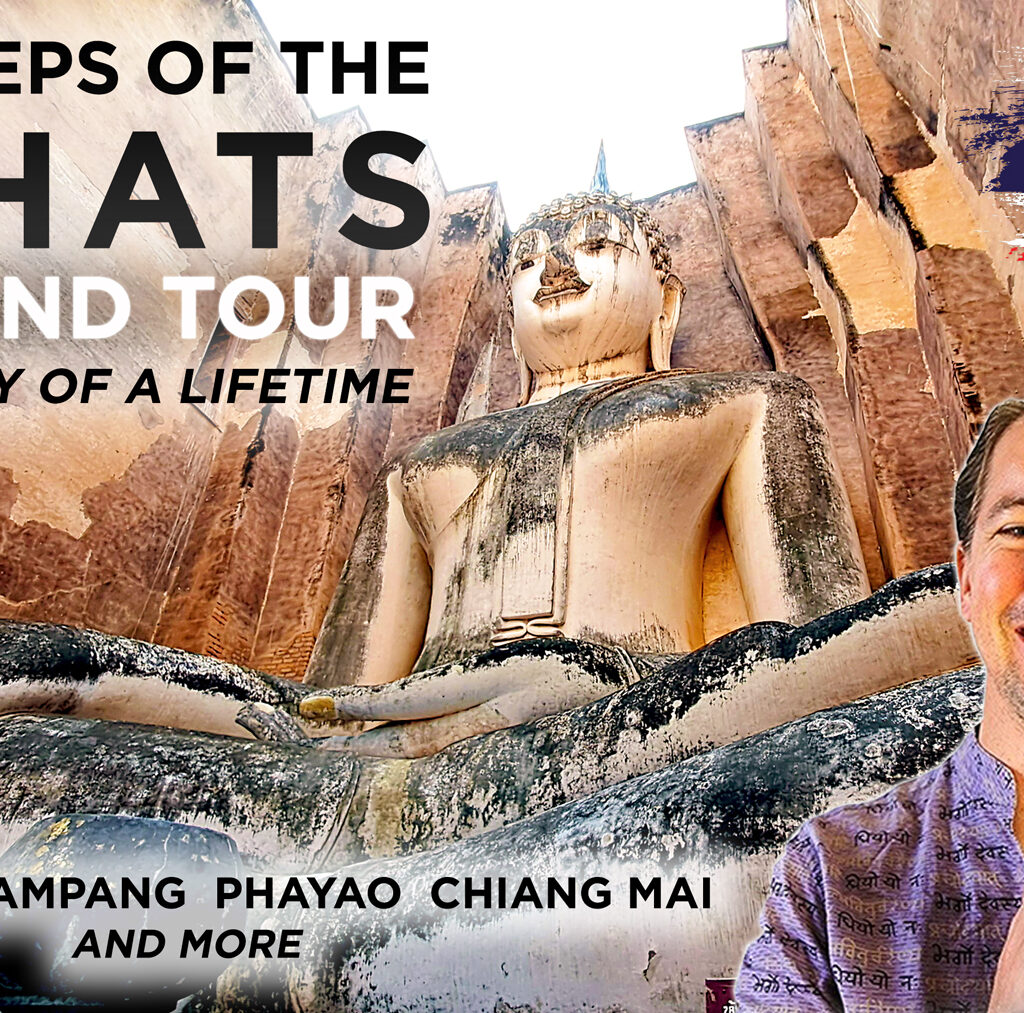
FOOTSTEPS OF THE ARHATS THAILAND TOUR THE JOURNEY OF A LIFETIME EMBRACE PILGRIMAGE AS A SPIRITUAL PRACTICE OF ONENESS THE SACRED YATRA EXPERIENCE with Jason Gregory JANUARY 2026 The Sacred Yatra Experience is the ultimate pilgrimage of the spiritual traditions of Asia. The Footsteps of the Arhats Thailand Tour is one of the most unique travel experiences in the world. You can travel with author, philosopher, and teacher Jason Gregory on a mystical tour of Thailand to explore and trace the footsteps the Thai hermits and mystics. Get unique insights into Jason’s knowledge of the East and the memory of the masters and scared places you will visit. Jason wishes to take people to the most sacred places in Thailand to show that the ancient Hindu and Buddhist cultures are thriving. But this can only be experienced by those willing to join him on this pilgrimage of the heart. 1. About our tour to Thailand Our 10-day itinerary includes visits to the most breathtakingly beautiful and mystical places in Thailand. We will travel through Thailand to visit the most important sacred places in Thai history related to Theravada Buddhism and Hinduism. Most people never get the chance to experience face-to-face the archaic origins and sacred sites of Thailand’s spiritual culture. But on this journey, you will get a once in a lifetime opportunity to actually feel the ancient living spiritual culture that is still thriving in the sacred places you will visit. You will also get the chance to meet real-life mystics and mingle with the beautiful people of Thailand. What is more, during the tour you will take part in private discourses given by Jason Gregory. He will show you the significance of how the great Eastern spiritual traditions can help you live more harmoniously in the modern world. You will begin to understand the deep wisdom the mystics of the East expounded for you to find true happiness and fulfilment in this life. And this is the reason for joining Jason Gregory on his tour of Thailand to follow in the footsteps of the great Buddhist masters. This is a once-in-a-life-time experience! 2. ITINERARY Day 1 – Arrival to Sukhothai, Thailand (January 22, 2026) From Bangkok, there are only two flights daily to Sukhothai. Arrival at Sukhothai Airport in Sukhothai, Thailand. A representative of the tour team will welcome guests at the Sukhothai Airport and transport them to the hotel. After the check-in process at the hotel, guests will have time to rest and recuperate while all guests arrive at the hotel. Day 2 – Ancient Sukhothai Historical Park (January 23, 2026) On day 2, we will rise early and visit Mahathat Temple for a sunrise meditation. Later in the morning after breakfast, we will ride cycles around the ancient Sukhothai Historical Park, exploring the Hindu and Buddhist ruins. The ruins of Sukhothai, literally ‘dawn of happiness’, is the capital of the Sukhothai Kingdom in the 13th and 14th centuries. In the evening, we will explore the local markets and mingle with the community of Sukhothai. Day 3 – Wat Phra Sri Rattana Mahathat Rajaworaviharn and Travel to Lampang (January 24, 2026) On day 3, we will travel to Lampang. On the way, we will stop by the sacred Wat Phra Sri Rattana Mahathat Rajaworaviharn Temple. Wat Phra Si Rattana Mahathat Ratchaworawihan is a first-class royal temple in Si Satchanalai, Sukhothai, Thailand. In the afternoon, we will arrive to Lampang and visit the famous Lampang night markets to experience the beautiful Thai culture. Day 4 – Wat Phra That Lampang Luang, Sky Pagodas, and Travel to Phayao (January 25, 2026) On day 4, we will travel to Phayao. But before that, we will visit Wat Phra That Lampang Luang in the morning. On the road to Phayao, we will stop at the iconic Sky Pagodas where ancient hermits used to renounce the world. In the evening, we will enjoy dinner over the famous Phayao Lake, the largest freshwater lake in the northern region and the fourth largest in the country. Day 5 – Wat Analayo Thipphayaram, Phutthakhaya Pagoda, and the Submerged Temple (January 26, 2026) In the morning on day 5, we will travel to Wat Analayo Thipphayaram. The temple is beautifully nestled in the jungle. It is a very large temple complex on the slopes of Doi Luang, overlooking the Phayao Lake. A myth involving a monk called Phra Achan Phibun Sumangkhalo from Wat Rattanawanaram in Phayao had a dream and vision that resulted in the establishment of a temple on the mountain on the other side of the Kwan Phayao. Next, we will travel to Phutthakhaya Pagoda which is a replica of the Mahabodhi Temple where the Buddha attained enlightenment. This temple is in the middle of the jungle and feels deserted. In the afternoon, we will get a boat ride over the submerged temple, Wat Tilok Aram. Submerged beneath the Phayao Lake is the 500-year-old temple. A stone inscription records that King Tilokkarad commanded Chao San Hua, the King of Muang Phayao, to establish the temple in 1476 – 1486 as an offering to the greatest king in the region. The temple stood for nearly five centuries until an irrigation project in 1939 inundated the temple, along with more than 10 other ancient sites. We will end the day relaxing in this scenic town as we enjoy each other’s company. Day 6 – Travel to Chiang Dao and Wat Tham Pha Plong (January 27, 2026) On day 6, we will travel to Chiang Dao in the morning. In the afternoon, we will visit Wat Tham Pha Plong, a monastery nestled in the mountains of Chiang Dao. Day 7 – Wat Tham Chiang Dao Cave Temple, Wat Ban Den, and Travel to Chiang Mai (January 28, 2026) On day 7, after breakfast we will explore the famous cave temple, Wat Tham Chiang Dao. According to legend, the sage Phra Rama Rishi, renowned for his profound meditation, invoked divine
FOOTSTEPS OF THE MAHASIDDHAS LADAKH TOUR 2025
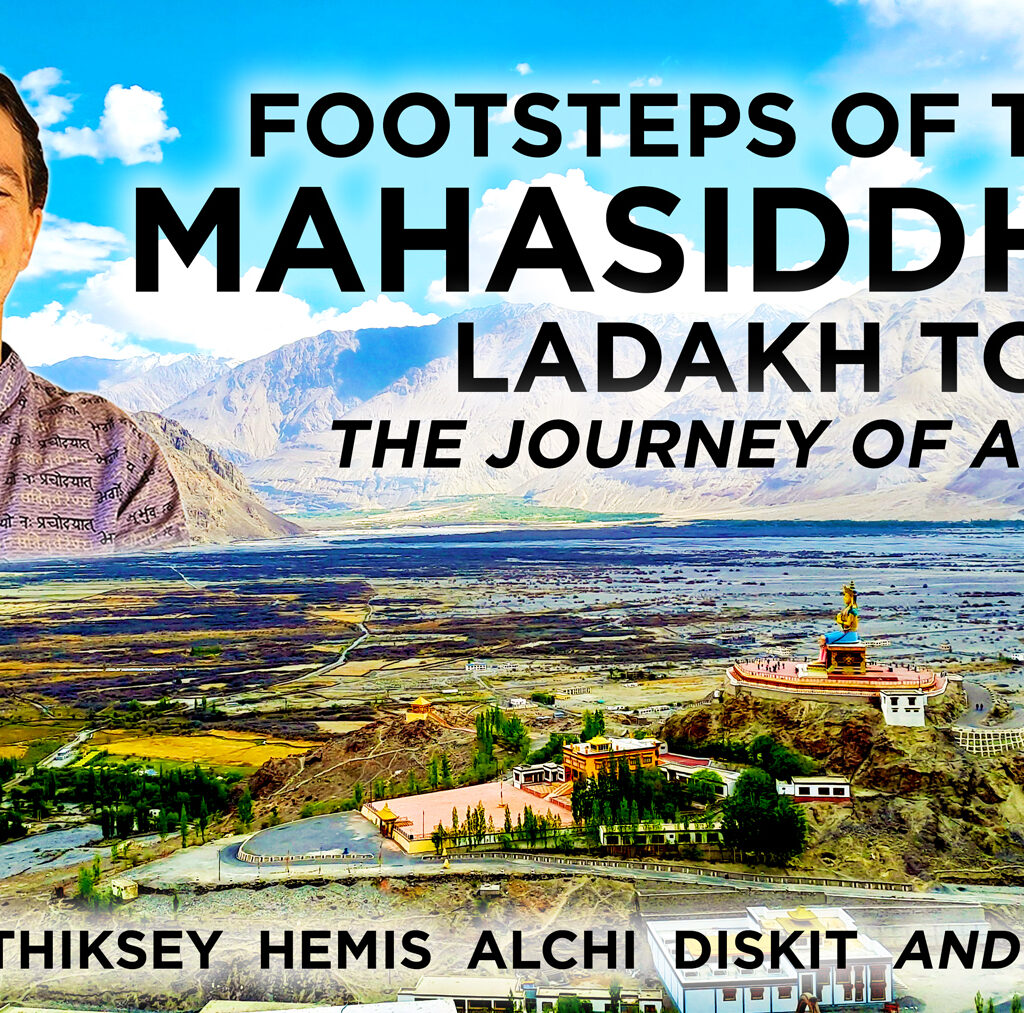
FOOTSTEPS OF THE MAHASIDDHAS LADAKH TOUR THE JOURNEY OF A LIFETIME REVIVING THE LOST SPIRITUAL PRACTICE OF PILGRIMAGE THE SACRED YATRA EXPERIENCE with Jason Gregory AUGUST 2025 IMPORTANT NOTE Ladakh is a high altitude region, ranging from 9,800 to 18,000 feet (3,000 to 5,500 meters). The majority of our tour will take place at 11,550 feet (3500 meters) high. Participants must have a good level of physical fitness. The Ladakhi Government recommends all tourists to take a 48 hours resting period after arrival. As a result, the first 2 days of our tour has been allocated for rest and hydration. By joining this tour, you acknowledge these risks and confirm your fitness. A signed High Altitude Risk Disclaimer for Travel to Ladakh and Acknowledgment of Risks and Release of Liability is required. Document will be provided upon booking. The Sacred Yatra Experience is the ultimate pilgrimage of the spiritual traditions of Asia. The Footsteps of the Mahasiddhas Ladakh Tour is one of the most unique travel experiences in the world. You can travel with author, philosopher, and teacher Jason Gregory on a mystical tour of Ladakh to explore and trace the footsteps the Himalayan hermits and mystics. Get unique insights into Jason’s knowledge of the East and the memory of the masters and scared places you will visit. Jason wishes to take people to the most sacred places in Ladakh to show that the ancient Hindu and Buddhist cultures are thriving. But this can only be experienced by those willing to join him on this pilgrimage of the heart. 1. About our tour to Ladakh Our 11-day itinerary includes visits to the most breathtakingly beautiful and mystical places in Ladakh. We will travel through Ladakh to visit the most important sacred places in Ladakhi history. Most people never get the chance to experience face-to-face the archaic origins and sacred sites of Ladakh’s spiritual culture. But on this journey, you will get a once in a lifetime opportunity to actually feel the ancient living spiritual culture that is still thriving in the sacred places you will visit. You will also get the chance to meet real-life mystics and mingle with the beautiful people of Ladakh. What is more, during the tour you will take part in private discourses given by Jason Gregory. He will show you the significance of how the great Eastern spiritual traditions can help you live more harmoniously in the modern world. You will begin to understand the deep wisdom the mystics of the East expounded for you to find true happiness and fulfilment in this life. And this is the reason for joining Jason Gregory on his tour of Ladakh to follow in the footsteps of such great Buddhist masters as Padmasambhava. This is a once-in-a-life-time experience! 2. ITINERARY Day 1 – Arrival to Leh, Ladakh (August 24, 2025) Arrival at Kushok Bakula Rimpochee Airport in Leh. A representative of the tour team will welcome guests at the Kushok Bakula Rimpochee Airport and transport them to the hotel. After the check-in process at the hotel, guests will have time to rest and recuperate while all guests arrive at the hotel. It will be imperative for all guests to rest as much as possible in the first two days to acclimatize to the altitude. Day 2 – Rest, Relax, and Acclimatize (August 25, 2025) On day 2, we will all rest and acclimatize to the altitude. We will explore the Leh Market area to enjoy the local cuisine and explore the local markets as we adjust to the altitude throughout the day. Day 3 – Leh Palace, Tsemo Maitreya Monastery, Spituk Monastery, and Stok Monastery (August 26, 2025) On day 3, we officially hit the road and begin our journey. We will explore four of the most significant locations in the Leh region. In the morning, we will visit the Leh Palace, the former royal palace overlooking the city of Leh. It was constructed circa 1600 AD by Sengge Namgyal. The palace was abandoned when Dogra forces took control of Ladakh in the mid-19th century and forced the royal family to move to Stok Palace. Next in the morning, we will visit the Tsemo Maitreya Monastery, which was founded by King Tashi Namgyal (1555-1575) of Ladakh. It has a three-story high gold statue of Maitreya Buddha and ancient manuscripts and frescoes. It is situated near the Tsemo Castle. In the afternoon, we will visit Spituk Monastery. This monastery has one of the most breathtaking views of the airports, where you can witness planes flying in and out from Leh. The site of Spituk was blessed by the Arhat Nyimagung. The monastery is home to 100 monks and a giant statue of Kali (unveiled during the annual festival). Late in the afternoon, Jason will take you to one of his favorite tea shops in the world at Stok Monastery, with the most breathtaking views of the Himalayas you will see while enjoying a tea. Day 4 – Travel to Alchi and Alchi Monastery (August 27, 2025) Alchi is a village located on the banks of the Indus River 70km (43.49miles) downstream from the capital, Leh. Unlike the other monasteries in Ladakh, Alchi is situated on lowland, not on a hilltop. The village is famous for the existence of one of the oldest monasteries in Ladakh, Alchi Monastery, mainly known for its magnificent and well-preserved 11th or 12th-century wall paintings, all in an Indo-Himalayan style. The monastery houses thousands of rare and unique sculptures and paintings dating back to 11th century Western Tibet. On day 4, we will travel to the small village of Alchi and visit one of the oldest monasteries in Ladakh, the Alchi Monastery. Day 5 – Likir Monastery and Travel to Thiksey (August 28, 2025) On day 5, we will travel to Thiksey, but along the way, we will visit the Likir Monastery, the famous Klu-kkhyil (meaning “water spirits” who once lived there) monastery. The Likir Monastery was first built in the 11th century and was rebuilt in the 18th century, and currently has a 25-foot-tall (7.6 m) gold-covered Maitreya Buddha statue. We will arrive in Thiksey village in the afternoon to enjoy
The Teachings of Oneness in the Bhagavad Gita Course
The Teachings of Oneness in the Bhagavad Gita Course Four Live Zoom Classes | Every Saturday from February 1 – February 22, 2025 The deeper teachings of the Bhagavad Gita are often lost due to a warping of the text to suit the philosophical agenda of certain organized groups, no matter whether that warping is based on a dualist view or the ardent focus on devotion. As a result, the original teachings, which are nondual, are misunderstood. The true teachings of oneness in the Bhagavad Gita are usually misunderstood due to the complex cultural aspects of the great scripture. These aspects are not only lost somewhat within India but also inhibit a foreigner’s understanding of the Bhagavad Gita, especially due to the lack of traditional knowledge and values in the modern world. By returning to tradition, in this case to the true nature of Sanatana Dharma (Hinduism), one will begin to comprehend the subtlety of the Bhagavad Gita, which will open the door to a deeper exploration of the nondual teachings within the scripture. The Teachings of Oneness in the Bhagavad Gita Course is a comprehensive exploration and restoration of the original teachings of the Bhagavad Gita. Rooted in the tradition of Sanatana Dharma, the Bhagavad Gita is demystified in this course, revealing the genuine essence of living in harmony with one’s Dharma. Class 1: Modules 1 and 2 Module 1: Introduction to the Bhagavad Gita Explore the key concepts and principles of the Bhagavad Gita from the ancient traditional perspective of Sanatana Dharma. Understanding the traditional perspective and the key concepts and principles will guide us into a deeper comprehension throughout the following modules. Module 2: The Foundations of Yoga in the Bhagavad Gita We will explore the true nature of yoga as we find it in the Bhagavad Gita. I will explain the very ancient yoga far before the Bhagavad Gita that informs the scripture as we traverse the numerous forms of yoga, from the highest yoga to the importance of the yoga of surrender. Class 2: Modules 3 and 4 Module 3: Who is the Hero of the Great War? I will explain the importance of the Kurukshetra War, where the Bhagavad Gita takes place. To understand the importance of this war, we will explore the ancient philosophical teachings of Samkhya and Yoga alongside the traditional cultural systems that help resolve the debate between free will versus divine will. Module 4: Yoga on the Battlefield of Life The Kurukshetra War in the Bhagavad Gita represents a reflection of our own trials and tribulations in life. I will explain in-depth the nature of this battlefield and the path of yoga set out for each and every one of us to be the hero of our own story. Class 3: Modules 5 and 6 Module 5: Transcending the Power of Maya There are many misunderstandings of the concept of maya due to poor translations and a lack of spiritually intuiting the meaning correctly. I will explain what the concept of maya is within the Bhagavad Gita and the practices we need to employ to transcend its power so that we can abide in the oneness of Brahman, which is the Ultimate Reality of existence beyond God. Module 6: Personal and Impersonal Love of the Divine We can often get swept up with our own quest for enlightenment by yearning for the impersonal Brahman and neglect the need for our personal love of the divine through the tradition of the Devatas, which keeps us humbly human. I will explain the Devata tradition and why devotion is important for spiritual growth. Class 4: Modules 7 and 8 Module 7: The Secret Path of Meditation and the Vision of the Divine There is a secret path of meditation in the Bhagavad Gita that is not often discussed, nor is it usually considered one of the generic paths of yoga. But I will explain the concepts and practices of this secret meditation so that we can finally embrace the true vision of the divine, which was an unconventional revelation taught by Krishna that was a truth hard for Arjuna to accept. Module 8: The Ultimate Yoga Beyond the Bhagavad Gita An ultimate yoga reserved for the great sages exists once we comprehend the true teachings of the Bhagavad Gita. I will explain the teachings of this ultimate yoga and why it is a path found by few and only for those who are ready to taste the sweet nectar of the Truth. We will finish the course by having a discussion on everything we have learned in the past four weeks. Price and Schedule Cost is $200 USD. Classes will be held at 11:00 AM – 12:30 PM US Eastern time. A Zoom invitation with password will be sent Thursday prior to each weekend. A video recording of the class will be sent to your email address and the link will be available for 30 days. To secure your spot, please make payment in full with your name and email address to the following link. Course registration is valid until January 30, 2025. Refund Policy After January 30, 2025, payment is nonrefundable. This refund policy is in place because from January 30, 2025 all of the course material will have been set for the expected number of attendees. There will be no refund after January 30 as a result. COURSE REGISTERATION
The Advanced Teachings of Taoism Course
The Advanced Teachings of Taoism Course Six Live Zoom Classes | Every Saturday from March 8 – April 12, 2025 Taoism, the most bastardized spiritual tradition and philosophy in the world, has fallen victim to misunderstanding, misinterpretation, and misinformation due to incorrect translations of the Tao Te Ching and Chuang-tzu texts. These flawed translations have stripped the original meanings, catering instead to a predominant Western audience with specific cultural sensibilities. However, these translations are inaccurate and distort the authentic meaning and intent of the sacred Taoist texts. Misinformation is eroding the essence of the Taoist tradition, creating an urgent need for clarity regarding what Taoism truly represents and what it means to be Taoist. The Advanced Teachings of Taoism Course is a comprehensive exploration and restoration of Taoism. Rooted in the philosophy of nature, Taoism is demystified in this course, revealing the genuine essence of living in harmony with the natural way, the Tao. Class 1: Modules 1 and 2 Module 1: Reclaiming Taoism Explore Taoism from the ancient Chinese traditional perspective based on the two source texts, the Tao Te Ching and the Chuang-tzu. I will explain why classical Taoism is actually a lot different from how a lot of people think about Taoism today. Module 2: The Metaphysical Framework of Taoism For the first time ever recorded, I will explain the metaphysical framework, all the way from the undifferentiated reality to the manifest world. I go into how that universal unfolding is reflected in our very being, making the human being a reflection of the entire universe. Class 2: Modules 3 and 4 Module 3: Taoism’s Critique of Confucianism and Socialization We will explore how Taoism was actually a critique of Confucianism throughout the Warring States period of China. In doing so, I will dispel a lot of the false views around Confucius and Confucianism. I will explain why Taoism is the real natural system, which goes deep into its critique of how Confucius had this strange belief that by following his rules and regulations, that is what made us natural again. Module 4: The Dissolution of Identity Taoism’s ultimate aim is the dissolution of identity so that the undifferentiated Tao can make use of an individual. This is never spoken about in pop-Taoism for some reason, but from an ancient traditional perspective, Taoism is very similar to other nondual traditions throughout Asia. Though Taoism does differ slightly from the strict nondual traditions, it has a more holistic, integral teaching. I will explain in this module Taoism’s integral nondual approach. Class 3: Modules 5 and 6 Module 5: The Immorality of Morality I will explain the illusion of morality based on the teachings of Chuang-tzu and, as a result, why Taoism is an amoral tradition centered on nature and not governed by man-made morals. No one ever explores the amoral perspective of Taoism because most people don’t know about it or are afraid to speak about it candidly in the face of our moral systems. In understanding the amorality of Taoism in this course, you will have a roadmap to go beyond the illusions of good and evil to come closer to an understanding of true oneness, which is the goal of Taoism. Module 6: The Politically Incorrect Nature of Taoism This module covers the politically incorrect nature of Taoism and why a society stricken with political correctness is unnatural. I will explain some of the deepest, yet misunderstood stories from the Chuang-tzu text so that you can understand the natural amoral perspective of Taoism. I explain that Chuang-tzu himself had to also deal with the politically correct nonsense of Confucianism, as we do too in the modern world. As a result, I will use the teachings of Chuang-tzu to critique the modern politically correct attitude that is infecting innocent people’s minds in the present day. Class 4: Modules 7 and 8 Module 7: Beyond Good and Evil We will explore why Taoism believes our human nature is fundamentally good. In doing so, I will destroy the commonly held assumption that we are beasts from birth. I will explain this by using Taoism to analyze Confucianism, the Abrahamic faiths, and other Western traditions that believe we are beasts from birth. Module 8: The Simple World vs. The Complex World Moving constantly into a complex world is something Lao-tzu and Chuang-tzu warned us about. They knew if we fell for the artificial linguistic conventions and cultural frameworks, it would be hard to wrestle our awareness from these tools of partiality so that we could see the world as it truly is. I will explain in this module the subtle battle between the natural, simple world and the evolving, complex world. We will explore Lao-tzu’s teaching of the two desires and Chuang’s great undoing so that we can attune to the Tao. Class 5: Modules 9 and 10 Module 9: The Art of Doing Nothing The essential Taoist teaching of wu-wei can be a confusing concept for those who are addicted to doing. Modern teachers and students of Taoism are also puzzled by wu-wei, as we discover through many people adapting it to their own sensibilities. We need to understand wu-wei as it is. I will explain the different translations of wu-wei and how in essence all interpretations lead to nondoing. Module 10: The Spontaneous Reality The real world of the Tao is a spontaneous reality. The sage lives in this spontaneous reality. I will explain the nature of this spontaneous reality by delving into the Taoist concept of tzu-jan (naturalness), the illusion of thinking, mind seeking, and the hidden teaching of what thoughts would be without language. I will expand this knowledge through an exploration into the concept of the unsupported thought and how the unconscious linkage of thoughts create the identity. Class 6: Modules 11 and 12 Module 11: Free and Easy Wandering in Oneness I explain the ultimate teaching after wu-wei, xiaoyao you (free and easy wandering in oneness). Xiaoyao you
Footsteps of the Himalayan Yogi Nepal Tour 2024
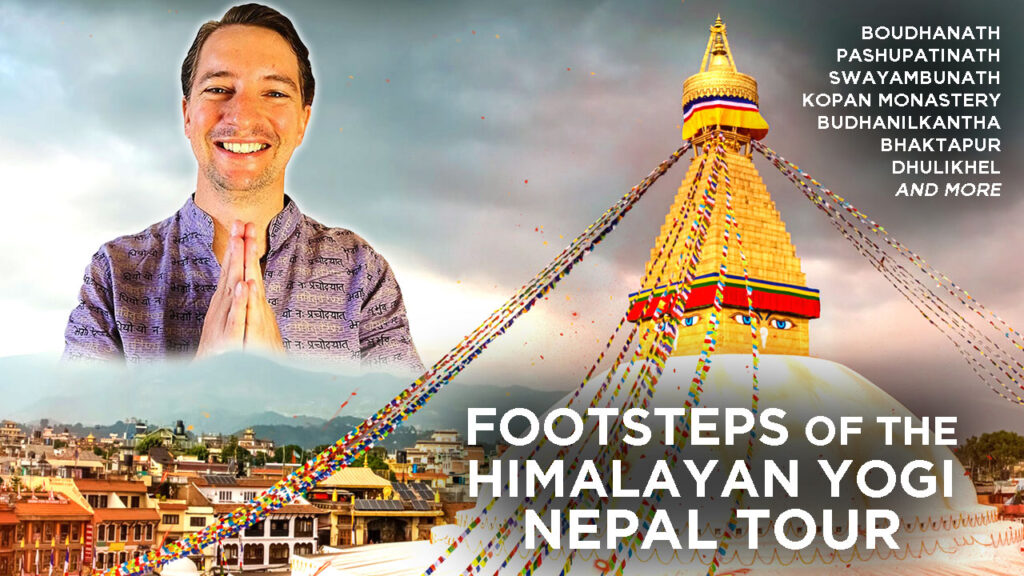
FOOTSTEPS OF THE HIMALAYAN YOGI NEPAL TOUR THE SACRED YATRA EXPERIENCE with Jason Gregory NOVEMBER 2024 The Sacred Yatra Experience is the ultimate pilgrimage of the spiritual traditions of Asia. The Footsteps of the Himalayan Yogi Nepal Tour is one of the most unique travel experiences in the world. You can travel with author, philosopher, and teacher Jason Gregory on a mystical tour of Nepal to explore and trace the footsteps of the Himalayan Yogi. Get unique insights into Jason’s knowledge of the East and the memory of the masters and scared places you will visit. Jason wishes to take people to the most sacred places in the sacred Kathmandu valley to show that the ancient Hindu and Buddhist cultures are thriving. But this can only be experienced by those willing to join him on this pilgrimage of the heart. 1. About our tour to Nepal Our 10-day itinerary includes visits to the most breathtakingly beautiful and mystical places in Nepal. We will travel through Nepal to visit the most important sacred places in Nepalese history. Most people never get the chance to experience face-to-face the archaic origins and sacred sites of Nepal’s spiritual culture. But on this journey, you will get a once in a lifetime opportunity to actually feel the ancient living spiritual culture that is still thriving in the sacred places you will visit. You will also get the chance to meet real-life mystics and mingle with the beautiful people of Nepal. What is more, during the tour you will take part in private discourses given by Jason Gregory. He will show you the significance of how the great Eastern spiritual traditions can help you live more harmoniously in the modern world. You will begin to understand the deep wisdom the mystics of the East expounded for you to find true happiness and fulfilment in this life. And this is the reason for joining Jason Gregory on his tour of Nepal to follow in the Footsteps of the Himalayan Yogi. This is a once-in-a-life-time experience! 2. ITINERARY Day 1 – Arrival to Kathmandu (November 12, 2024) Arrival at Tribhuvan International Airport in Kathmandu. A representative of the tour team will welcome guests at the Tribhuvan International Airport and transport them to the hotel. After the check-in process at the hotel, guests will have time to rest and recuperate while all guests arrive at the hotel. Day 2 – Boudhanath & Pashupatinath Temple (November 13, 2024) On day 2, we will explore two of the most sacred sites for Buddhists and Hindus in the Kathmandu Valley. In the morning, we will visit Boudhanath, one of the largest spherical stupas in the world because of its massive mandala. The Boudhanath Stupa is a sacred place of pilgrimage for Buddhists. We will circumambulate the stupa many times in meditation. Later, we will enjoy all the wonderful shops and culture that are thriving in Boudhanath. In the late afternoon, we will visit the famous Pashupatinath Temple located along the Bagmati River. This is a very sacred temple for Hindus and is considered the most sacred place in Nepal. The temple serves as the seat of Nepal’s national deity, Pashupati, who is an incarnation of the Hindu god Shiva. We will explore the temple complex, visiting the ritual cremation ghats and the many sadhus along the banks of the Bagmati River. In the early evening, we will attend the Pashupatinath Bagmati Aarti, a sacred Hindu ritual performed along the banks of the Bagmati River. Day 3 – Bhaktapur Durbar Square (November 14, 2024) On day 3, we will travel to the ancient city of Bhaktapur and visit the famous Bhaktapur Durbar Square. Bhaktapur is the largest of the three Newar kingdoms; the other two kingdoms are Kathmandu and Patan. All three are home to a Durbar Square (royal palace), but Bhaktapur’s Durbar Square is the most impressive. It actually consists of four distinct squares (Durbar Square, Taumadhi Square, Dattatreya Square, and Pottery Square). It has Hindu and Buddhist iconography scattered all throughout the complex. We will explore this ancient complex all throughout the day. Day 4 – Kopan Monastery & Pullahari Monastery (November 15, 2024) In the morning, we will travel to the Kopan Monastery. This monastery is a famous place for retreat for Tibetan Buddhists and is very popular with the locals. We will explore the monastery grounds and meditate in the temple in the morning. After lunch at Kopan Monastery, we will walk up to Pullahari Monastery. This monastery is one of the most peaceful places in the Kathmandu Valley. It’s not as well known as Kopan Monastery, which makes it a lot more quiet and conducive for meditation. It is a hidden gem in the Kathmandu Valley. Day 5 – Swayambunath & Budhanilkantha Temple (November 16, 2024) On day 5, early in the morning, we will go to the Swayambunath Stupa. This stupa is picturesque as it sits atop a hill in the Kathmandu Valley. Swayambunath is second only to Boudhanath for Tibetan Buddhists, though it is one of Jason’s favorite stupas in the world. On top of this hill, you get a wonderful view of the Kathmandu Valley. We will also circumambulate the foot of the hill, which is lined with prayer wheels for meditation. Along our circumambulation, we will arrive at the Buddhist trinity statues of Amitabha Buddha, Avalokitesvara (Guanyin), and Padmasambhava (Guru Rinpoche), where we will meditate. Later in the morning, we will visit the Budhanilkantha Temple. Located in Budhanilkantha, Budhanilkantha Temple is a Hindu open-air temple dedicated to Lord Mahavishnu. Budhanilkantha Temple is also known as Narayanthan Temple and is famous for a large reclining statue of Lord Mahavishnu. After lunch, we will visit Nagi Gompa Hermitage, where the great Dzogchen master, Tulku Urgyen Rinpoche, spent 33 years of his life, including two decades in retreat. We will explore the hermitage and meditate over the clear view of the Kathmandu Valley from the north to the south. Day 6 – Kailashnath Mahadev and Travel
Footsteps of Shiva South India Tour 2023
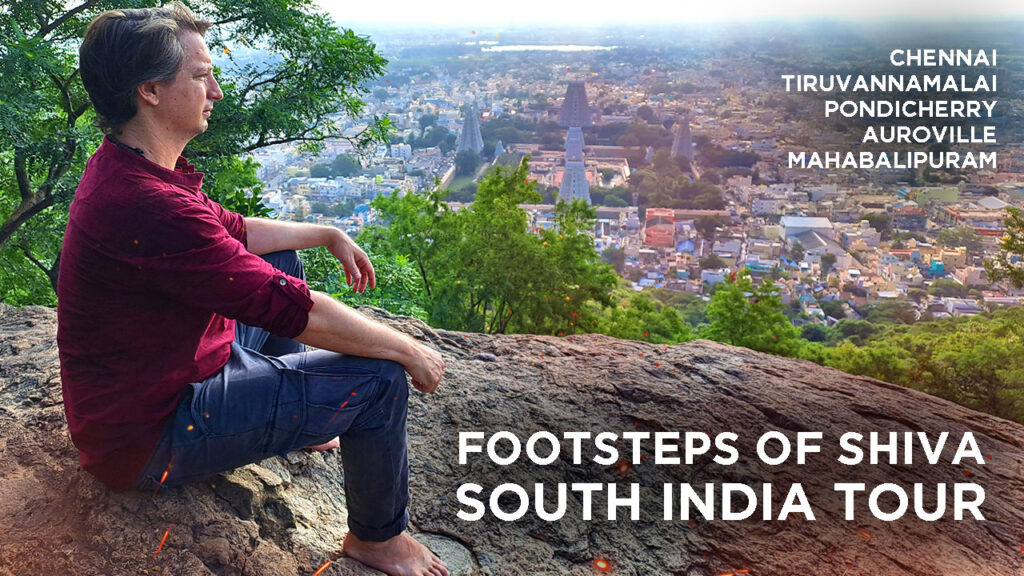
FOOTSTEPS OF SHIVA SOUTH INDIA TOUR THE SACRED YATRA EXPERIENCE with Jason Gregory January 2023 The Sacred Yatra Experience is the ultimate pilgrimage of the spiritual traditions of Asia. The Footsteps of Shiva South India Tour is one of the most unique travel experiences in the world. You can travel with author, philosopher, and teacher Jason Gregory on a mystical tour of South India to explore and trace the footsteps of the great spiritual masters. Get unique insights into Jason’s knowledge of the East and the memory of the masters and sacred places you will visit. Jason wishes to take people to the most sacred places of South India to show that the ancient Eastern spiritual cultures are thriving but can only be experienced by those willing to join him on this pilgrimage of the heart. 1. About our tour to India: Our 10-day itinerary includes visits to the most breathtakingly beautiful and mystical places in South India. We will travel through South India to visit the most important sacred places in Indian history. Most people never get the chance to experience face-to-face the archaic origins and sacred sites of India’s spiritual culture. But on this journey, you will get a once in a lifetime opportunity to actually feel the ancient living spiritual culture that is still thriving in the sacred places you will visit. You will also get the chance to meet real-life mystics and mingle with the beautiful people of India. What is more, during the tour you will take part in private discourses given by Jason Gregory. He will show you the significance of how the great Eastern spiritual traditions can help you live more harmoniously in the modern world. You will begin to understand the deep wisdom the mystics of the East expounded for you to find true happiness and fulfilment in this life. And this is the reason for joining Jason Gregory on his tour of South India to follow in the Footsteps of Shiva. This is a once-in-a-life-time experience! 2. ITINERARY Day 1 – Arrival to Chennai (January 24, 2023) Arrival at Chennai International Airport. A representative of the tour team will welcome guests at the Chennai Airport and transport them to the hotel. After the check-in process at the hotel, guests will have time to rest and recuperate before a day of exploring Chennai the following day. Overnight stay at the hotel in Chennai. Day 2 – Chennai (January 25, 2023) Exploring Chennai. Chennai (formerly known as Madras) is one of the most famous cities in India for the arts and spirituality. Chennai was an essential part of the evolution and revitalization of Vedanta into global consciousness. The great Swami Vivekananda realized this city’s importance within India and, as a consequence, established one of the most famous Ramakrishna Math Temples in the world. Alongside the revitalization of Vedanta in Chennai, in the late 1800’s, Madame Blavatsky and others established the Theosophical Society on the banks of the Adyar River in the south of Chennai. To this day, Adyar is still the headquarters of the Theosophical Society worldwide. Chennai is also famous for some of the most breathtaking temples in India, with unique Dravidian architecture. One such temple is the Kapaleeshwarar Temple, a temple dedicated to Shiva. On Day 2, we will visit the Kapaleeshwarar Temple, the Ramakrishna Math Temple, the Theosophical Society headquarters, and also mingle with the locals in the afternoon at the Marina Beach markets so that you can get a taste of the strong community within India. Day 3 – Tiruvannamalai (January 26, 2023) Travelling to Tiruvannamalai. Tiruvannmalai is considered one of the most sacred places on Earth. It has the ability to transform one’s life. It is known as the City of Enlightenment for that very reason. It has been the home of sages, sadhus, and yogis for thousands of years. Tiruvannamalai is home to the holy mountain Arunachala, which is thought to be an incarnation of Shiva. Arunachala is what drew the 20th century sage Ramana Maharshi to this little Indian town, where he remained silent for 7 years up on the holy mountain in meditation. During his life on the slopes and at the foot of Arunachala, disciples were attracted to his immense presence, and an ashram was built around him, the famous Sri Ramana Asramam. It was here that Paul Brunton had his famous encounter with the Maharshi and which consequently led to his international bestseller In Search of Secret India. This Hindu culture has never left this place, where you find sadhus descend on Tiruvannamalai every day, renouncing the world to be at the foot of Arunachala and to also spend time in meditation at the Arunachaleswarar Temple (Temple of Shiva). On Day 3, we will visit the Sri Ramana Ashram after lunch, and then we will visit the famous Girivalam Path to visit temples and be in the presence of sadhus. Day 4 – Tiruvannamalai (January 27, 2023) Early in the morning on day 4, we will go to Sri Ramana Ashram to observe Puja (Hindu ritual worship) and also meditate in the silence of this sacred space. We will then walk up to Skanda Ashram and Virupaksha Cave on Arunachala, where Sri Ramana Maharshi spent many years in silence. We will practice meditation in both places. In the afternoon, we will visit Arunachaleswarar Temple (Temple of Shiva) and explore its magnificent architecture and mythology. We will tour the city of Tiruvannamalai to get acquainted with the City of Enlightenment. Later in the day, we will again visit the famous Girivalam Path to visit temples and be in the presence of sadhus. Day 5 – Tiruvannamalai (January 28, 2023) We will rise early again on day 5 to walk up Arunachala and watch the sunrise over the Arunachaleswarar Temple and visit Skanda Ashram one last time to meditate before we embark on our day. On our last day in Tiruvannamalai, we will visit the Sri Ramana Ashram library to explore numerous sacred books before saying goodbye to our sadhu friends at Girivalam Path. Day 6 – Pondicherry (January 29, 2023) Pondicherry is an old
Footsteps of the Himalayan Yogis Nepal Tour 2019 with Jason Gregory
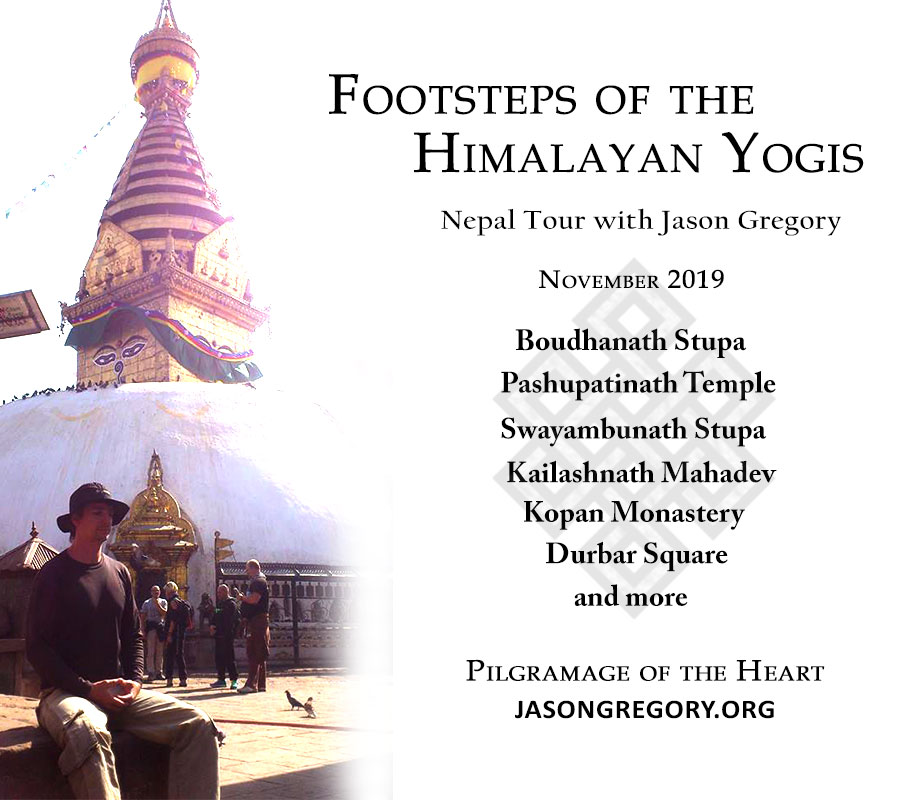
FOOTSTEPS OF THE HIMALAYAN YOGIS NEPAL TOUR with Jason Gregory 16-25 NOVEMBER 2019 The Footsteps of the Himalayan Yogis Nepal Tour is one of the most unique travel experiences in the world. You can travel with author, philosopher, and spiritual teacher Jason Gregory on a mystical tour of Nepal to explore and trace the footsteps of the Himalayan yogis. Get unique insights into Jason’s knowledge of the East and the memory of the masters and scared places you will visit. Jason wishes to take people to the most sacred places in the sacred Kathmandu valley to show that the ancient Hindu and Buddhist cultures are thriving. But this can only be experienced by those willing to join him on this pilgrimage of the heart. 1. About the tour of Nepal: Our 10-day itinerary includes visits to the most breathtakingly beautiful and mystical places of the Kathmandu Valley in Nepal. We will travel through Nepal to visit the most important sacred places of Nepalese history. Most people never get the chance to experience face to face the archaic origins and sacred sites of Hindu and Buddhist culture. But on this journey you will get a once in a lifetime opportunity to actually feel the ancient living culture that is still thriving in the sacred places you will visit. You will also get the chance to meet real life mystics and mingle with the beautiful people of Nepal. What is more, during the tour you will take part in private discourses given by Jason Gregory. He will show you the significance of how the great Eastern spiritual traditions can help you live more harmoniously in the modern world. You will begin to understand the deep wisdom the mystics of the East expounded for you to find true happiness and fulfillment in this life. And this is the reason for joining Jason Gregory on his tour of Nepal to follow the Footsteps of the Himalayan Yogis. This is a once in a life-time experience! Jason Gregory about the Nepal tour: “I have spent several years in Nepal and the experience has changed the entire course of my life. I continue to go back and visit every year. One of my favorite places in the world is the sacred Kathmandu Valley. The Hindu and Buddhist pilgrimage sites in the Kathmandu Valley are some of the most powerful and peaceful you will visit in the world. There is something magical about being in the Himalayas that the ancient Hindus and Buddhists understood. The mountains have a mystical presence that have attracted mystics for thousands of years. This is why the Kathmandu Valley is significant, as it is in the heart of the Himalayas. And luckily for all those on tour, we will be in this heart of the Himalayas that the mystics believed to be sacred. I have always told people that Nepal is hard to explain, the attraction people have to it, and its transformative ability on an individual. It is a place full of color, where the culture is vibrant and the people humble. Kathmandu Valley is a unique blend of past and present. My life in Nepal has not just been transformed by their ancient spiritual traditions, but also from the humble nature of the people and beautiful culture. This spiritual essence you experience in Nepal comes from thousands of years of people focused on the inner realm of spirituality that has led to many great sages and stories of enlightenment in the Himalayas. On this tour, I want to allow people to experience this living spirit that we feel when we are in the culture of Nepal by following the footsteps of the Himalayan Yogis. My experience of living in Nepal for several years allows me to take you on an insider’s journey of Nepal on this tour, where you will come face to face with the Himalayan soul. Plus you’ll also have a lot of fun, fun like you’ve never had before.” 2. ITINERARY Day 1 – Arrival to Kathmandu (16 November 2019) Arrival at Tribhuvan International Airport in Kathmandu. A representative of the tour team will welcome guests at the Tribhuvan International Airport and transport them to the hotel. After the check-in process at the hotel, guests will have time to rest and recuperate while all guests arrive at the hotel. Day 2 – Boudhanath & Pashupatinath Temple (17 November 2019) On day 2 we will explore two of the most sacred sites for Buddhists and Hindus in the Kathmandu Valley. In the morning we will visit Boudhanath, one of the largest spherical stupa’s in the world because of its massive mandala. The Boudhanath Stupa is a sacred place of pilgrimage for Buddhists. We will circumambulate the stupa many times in meditation. Later we will enjoy all the wonderful shops and culture that are thriving in Boudhanath. In the late afternoon we will visit the famous Pashupatinath Temple located along the Bagmati River. This is a very sacred temple for Hindus and considered the most sacred place in Nepal. The temple serves as the seat of Nepal’s national deity, Pashupati, who is an incarnation of the Hindu god Shiva. We will explore the temple complex, visiting the ritual cremation ghats and also the many sadhus along the banks of the Bagmati River. In the early evening we will attend the Pashupatinath Bagmati Aarti, a sacred Hindu ritual performed along the banks of the Bagmati River. Day 3 – Bhaktapur Durbar Square (18 November 2019) On day 3 we will travel to the ancient city of Bhaktapur and visit the famous Bhaktapur Durbar Square. Bhaktapur is the largest of three Newar kingdoms, the other two kingdoms are Kathmandu and Patan. All three are the home to a Durbar Square (royal palace), but Bhaktapur Durbar Square is the most impressive. It actually consists of four distinct squares (Durbar Square, Taumadhi Square, Dattatreya Square and Pottery Square). It has Hindu and Buddhist iconography scattered all throughout the complex. We will explore this ancient complex all throughout the day. Day 4 – Kopan Monastery & Pullahari
Footsteps of the Masters India Tour 2019 with Jason Gregory
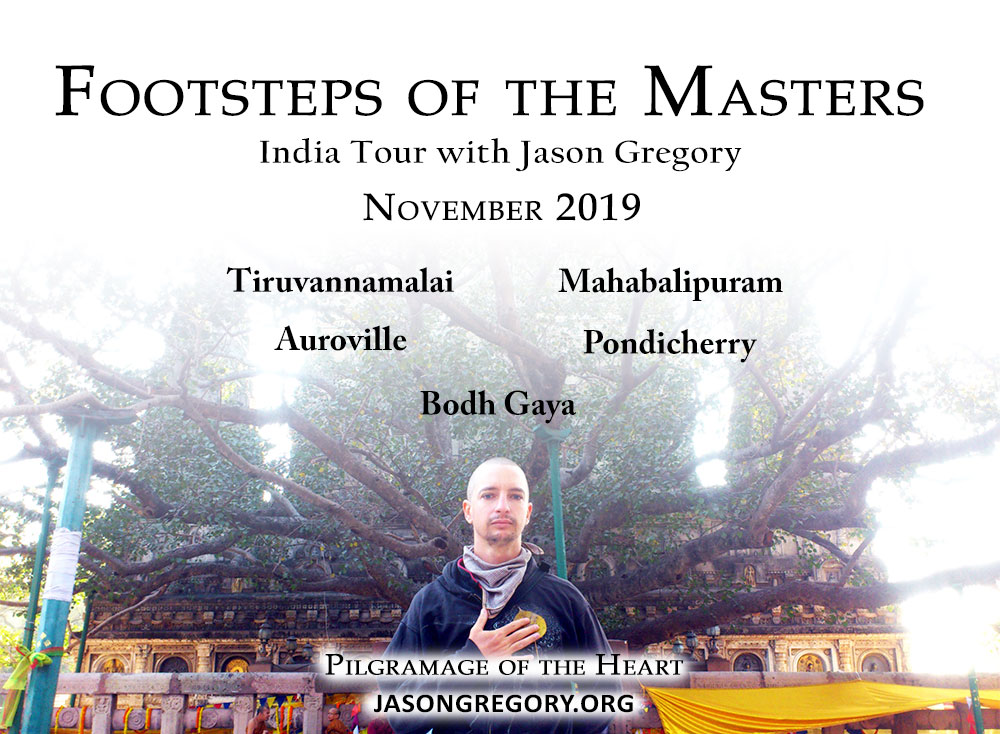
FOOTSTEPS OF THE MASTERS INDIA TOUR with Jason Gregory 1-13 NOVEMBER 2019 The Footsteps of the Masters India Tour is one of the most unique travel experiences in the world. You can travel with author, philosopher, and spiritual teacher Jason Gregory on a mystical tour of India to explore and trace the footsteps of the masters. Get unique insights into Jason’s knowledge of the East and the memory of the masters and scared places you will visit. Jason wishes to take people to the most sacred places of India to show that the ancient Hindu and Buddhist cultures are thriving but can only be experienced by those willing to join him on this pilgrimage of the heart. 1. About our tour to India: Our 13-day itinerary includes visits to the most breathtakingly beautiful and mystical places in India. We will travel through India to visit the most important sacred places of Indian history. Most people never get the chance to experience face to face the archaic origins and sacred sites of Hindu and Buddhist culture. But on this journey you will get a once in a lifetime opportunity to actually feel the ancient living culture that is still thriving in the sacred places you will visit. You will also get the chance to meet real life mystics and mingle with the beautiful people of India. What is more, during the tour you will take part in private discourses given by Jason Gregory. He will show you the significance of how the great Eastern spiritual traditions can help you live more harmoniously in the modern world. You will begin to understand the deep wisdom the mystics of the East expounded for you to find true happiness and fulfillment in this life. And this is the reason for joining Jason Gregory on his tour of India to follow the Footsteps of the Masters. This is a once in a life-time experience! Jason Gregory about the India tour: “I have spent several years in India and the experience has changed the entire course of my life. I continue to go back and visit every year, especially the Tamil Nadu and Bihar states as they are home the two places in the world I believe everybody should visit, Tiruvannamalai and Bodh Gaya, and we will be visiting both places on this tour. I have always told people that India is hard to explain, the attraction people have to it, and its transformative ability on an individual. It is a place that most people dislike from a distance because of real life hardships that people witness in India. But I have always implored people to persevere with her grace because if you can get past all the things that push you out of your comfort zone, there is an underlying essence of spirit that is only found in India, but you need to give her time and be open to new experiences. Many believe this comes from thousands of years of people focused on the inner realm of spirituality that has led to many great sages and stories of enlightenment in India. On this tour I want to allow people to experience this living spirit that we feel when we are in the culture of India by following the footsteps of the masters. My experience of living in India for several years allows me to take you on an insider’s journey of India on this tour where you will come face to face with her archaic soul. Plus you’ll also have a lot of fun, fun like you’ve never had before” 2. ITINERARY Day 1 – Arrival to Chennai (1 November 2019) Arrival at Chennai International Airport. A representative of the tour team will welcome guests at the Chennai Airport and transport them to the hotel. After the check-in process at the hotel, guests will have time to rest and briefly explore Chennai. Overnight stay at the hotel in Chennai. Day 2 – Tiruvannamalai (2 November 2019) Travelling to Tiruvannamalai. Tiruvannmalai is considered one of the most sacred places on Earth. It has the ability to transform one’s life. It is known as the City of Enlightenment for that very reason. It has been the home of sages, sadhus, and yogis for thousands of years. Tiruvannamalai is home to the holy mountain Arunachala, which is thought to be an incarnation of Shiva. Arunachala is what drew the 20th century sage Ramana Maharshi to this little Indian town, where he remained silent for 7 years up on the holy mountain in meditation. During his life on the slopes and at the foot of Arunachala disciples were attracted to his immense presence and an ashram was built around him, the famous Sri Ramana Asramam. It was here that Paul Brunton had his famous encounter with the Maharshi and consequently led to his international bestseller In Search of Secret India. This Hindu culture has never left this place, where you find sadhus descend on Tiruvannamalai every day renouncing the world to be at the foot of Arunachala and to also spend time in meditation at the Arunachaleswarar Temple (Temple of Shiva). During day 2 we will visit Arunachaleswarar Temple (Temple of Shiva) and explore its magnificent architecture and mythology. We will tour the city of Tiruvannamalai to get acquainted with the City of Enlightenment. Day 3 – Tiruvannamalai (3 November 2019) Early in the morning we will go to Sri Ramana Ashram to observe Puja (Hindu ritual worship) and also meditate in the silence of this sacred space. We will then walk up to Skanda Ashram and Virupaksha Cave where Sri Ramana Maharshi spent many years in silence. We will practice meditation in both places. Later in the day we will visit the famous Girivalam Path to visit temples and be in the presence of sadhus. Day 4 – Tiruvannamalai (4 November 2019) We will rise early again on day 4 to walk up Arunachala and visit Skanda Ashram one last time to meditate before we embark on our day. During our last day in Tiruvannamalai we will visit the Sri Ramana
Footsteps of the Masters India Tour with Jason Gregory 2018
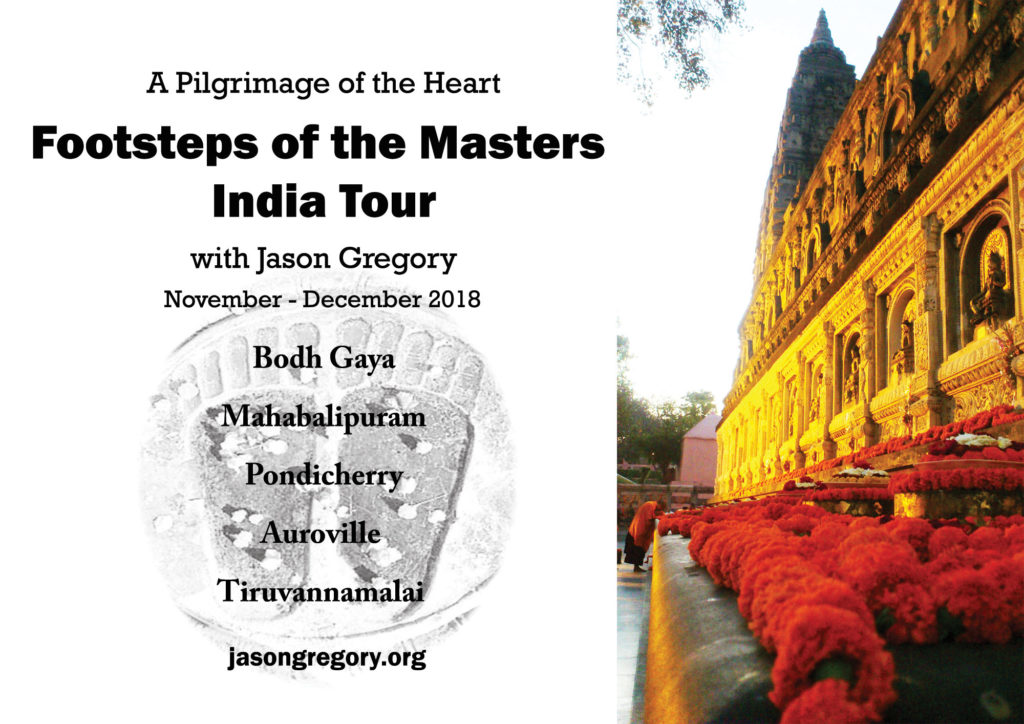
FOOTSTEPS OF THE MASTERS INDIA TOUR with Jason Gregory November 26-December 8, 2018 In 2018 you can travel with author and teacher of Eastern philosophy Jason Gregory on a mystical tour of India to explore and trace the Footsteps of the Masters. Get unique insights into Jason’s knowledge of the East and the memory of the masters and scared places we will visit. Jason wishes to take people to the most sacred places of India to show that the ancient Hindu and Buddhist cultures are thriving but can only be experienced by those willing to join him on this pilgrimage of the heart. 1. About our tour to India: Our 13-day itinerary includes visits to the most beautiful and mystical places in India. We will travel through India to visit the most important sacred places of Indian history. Most people never get the chance to experience face to face the archaic origins and sites of Hindu and Buddhist culture because they are in some of the most remote places of India. But on this journey you will get that once in a lifetime opportunity to actually feel the ancient living culture that is still thriving in the sacred places we will visit. You will also get the chance to meet real life mystics and mingle with the beautiful people of India. What is more, during the tour you will take part in private lectures given by Jason Gregory. He will show us the significance of how Eastern thought can help us live more harmoniously in the modern world. He strongly believes that the mystics of the East who expounded especially the Hindu philosophy of Vedanta, Zen in Buddhism, and Taoism are advanced philosophical and spiritual frameworks that give us understanding and guidance in our ordinary lives. And this is the reason for joining Jason Gregory on his tour to India to follow the Footsteps of the Masters. This will be a once in a life-time experience, this tour may never happen again! Jason Gregory about our India tour: “I have spent several years in India and the experience has changed the entire course of my life. I continue to go back and visit every year, especially the Tamil Nadu and Bihar states as they include the two places in the world that I believe everybody should visit, Tiruvannamalai and Bodh Gaya, and we will be visiting both places on this tour. I have always told people that India is hard to explain, the attraction people have to it, and its transformative ability on an individual. It is a place that most people dislike because of real life hardships that people witness in her. But I have always implored people to persevere with her grace because if you can get past all the things that push you out of your comfort zone, there is an underlying essence of spirit that is only found in India, but you need to give her time and be open to new experiences. Many believe this comes from thousands of years of people focused on the inner realm of spirituality that has led to many great sages and stories of enlightenment in India. On this tour I want to allow people to experience this living spirit that we feel when we are in the culture of India by following the footsteps of the masters. My experience of living in India for several years allows me to take you on an insider’s journey of India on this tour where you will come face to face with her archaic soul.” Jason Gregory is a spiritual philosopher, independent scholar, author, writer, public speaker, and teacher specializing in the fields of Eastern philosophy, Western esotericism, comparative religion, psychology, culture, and ancients civilizations. He is the author of the highly acclaimed Effortless Living, Fasting the Mind, Enlightenment Now, and The Science and Practice of Humility. Jason spends his time traveling, writing, and teaching around the world through his lectures and workshops centered on his work. His lectures and workshops are said to be one of the most insightful and inspirational events one can attend, as he reveals through his work that enlightenment is not an end goal that we are searching for, but instead a way of life which is an art of living. This understanding leads to the essence of his work that enlightenment evokes a humility which is a universal science. 2. ITINERARY Day 1 – Arrival to New Delhi (November 26, 2018) Arrival at Indira Gandhi International Airport. A representative of “One World Within Tours” company will welcome our guests at the Indira Gandhi International Airport and transport them to our hotel. After the check-in process at the hotel, our guests will have time to rest. In the evening we will have dinner and an organizing meeting with “One World Within Tours” company’s staff. Overnight stay at the hotel in New Delhi. Day 2 – Travel from New Delhi to Bodh Gaya (November 27, 2018) We will leave our hotel in New Delhi in the morning and we will fly to Patna, the capital city of Bihar. We will then travel by private bus from Patna airport to Bodh Gaya in the afternoon. Day 3 – Bodh Gaya (November 28, 2018) Bodh Gaya is considered one of the most sacred places on the planet. It is famously known as the place where Gautama the Buddha reached enlightenment under what became known as the Bodhi Tree. Over millennia temples and monasteries have been built around the famous Bodhi Tree. The Mahabodhi Temple and Bodhi Tree reside on the same site and is one of the most powerful places one could visit. It is a holy place for Buddhists, Hindus, and people who are not affiliated with no religion but class themselves as spiritual. On our first day in Bodh Gaya we will rise very early and meditate under the Bodhi Tree and spend a lot of time in the complex of the Mahabodhi Temple discussing its significance to the world. Day 4 – Bodh
